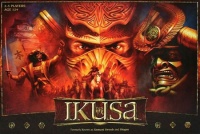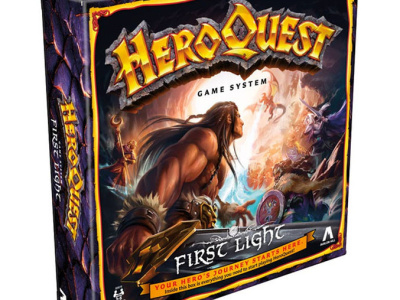 Ikusa (Board Game)
Ikusa (Board Game)Publisher: Hasbro/WotC
Release Date: July 2011
MSRP: $79.99
Number of Players: 2-5
Playing Time: Approx. 240 minutes
Product #: WOC34397
Age Rating: 12+
ICv2 Rating: 3.5 Stars out of 5
Hasbro, through its Wizards of the Coast subsidiary, has released Ikusa, a game of samurai warfare in feudal Japan. Ikusa is a strategic-level wargame that recreates the struggle for domination between various factions during one of the bloodiest periods of the island chain’s history. It is an attractively packaged and very playable game.
Summary: First, a bit of background. Ikusa is the third version of this game to be released. It was originally presented as Shogun in 1986 as part of Milton Bradley’s "Gamemaster" series of games, which also spawned the perennial favorite Axis & Allies. It was later re-released under the name Samurai Swords.
The game pits two to five players against each other in the role of would-be warlords, each with control of a number of territories and a small force of samurai warriors and armed peasants ("ashigaru"). Their goal is to dominate Japan through conquest. Though players are encouraged to use diplomacy and negotiation with their opponents, there are no mechanisms to enforce such deals. In the end, it is conflict that will choose the victor.
Similar to other games of this genre, players receive funds from the territories they control ("koku") which are then invested in units for their armies, fortifications to defend their holdings, and mercenary "ronin" that can offer a powerful surprise attack. There are a few interesting variations in Ikusa, including a bid for turn order (which changes from round to round) and, of course, the thematically necessary ninja, who offers to assassinate a foe or spy on a rival, but only to the highest bidder.
The armies, of course, are then dispatched to wrest control of territories from the enemy, using a combat system that makes use of the rarely-seen 12-sided die. Units vary in quality and armament, both offering different advantages in battle.
Originality: As this game is virtually unchanged from Mike Gray’s original design from some 25 years ago, it is difficult to say that it is "original." However, at the time of its initial release it did mark a significant evolution to the conquer-and-build genre, introducing concepts that have influenced game design ever since. It is a tribute to the design team that the game is still a strong contender, and has weathered the years very well. However, it does have a few elements that are a bit dated from the perspective of modern gaming tastes, and which are no longer as popular as they were in the past, such as player elimination.
Presentation: As can be expected from Wizards of the Coast, Ikusa is a solid production. The box is attractive, with a menacing samurai mask gracing the cover. The colors are a bit muted—mostly dark reds and oranges fading into black—but the title is eye-catching and readable. The board is similarly muted in color, but is very stylistic to the theme and setting of the game. Each player is equipped with a sturdy plastic tray to hold pieces and a cardboard screen to hid his bids. The 406 plastic miniatures are made from a flexible plastic to reduce breakage (a problem with earlier versions of the game). Unfortunately, this does result in a slight loss of sculptural detail.
One unfortunate change from the previous versions of the game was the elimination of the iconic samurai swords formerly used to determine turn order. They have been replaced with perfectly functional cardboard tokens, but gone is the tactile joy of “drawing your swords” to determine your fate…
Quality: The box is a little bit tight for the components included in the game, but it is adequate and not too large to store on a standard shelf. There is no storage tray included, but the individual bidding trays serve that purpose nicely. The board is fully mounted, while the cards sport a very nice linen finish.
I was rather disappointed with one thing, which I feel I must mention. It appears as though the text of the rulebook (and the back of the box) were simply lifted from an earlier version of the game, and certain component changes were not addressed in the rules. For example, there is mention of a "sorting tray" where players are meant to place neutral components like ronin warriors and the ninja. But no such tray exists. Instead a (rather flimsy feeling) cardboard box holds these pieces between games. Is it too much to ask that a new edition of a game at least include a completely re-written, updated, and accurate rulebook?
Marketability: Despite the age of the design, Ikusa is a solid contestant for its genre. Fans of this style of game will find a lot of appealing features. The theme of feudal Japan is one that has always been popular among hobby gaming enthusiasts. The $79.99 price tag is reasonable for the amount of playing pieces included and the quality of gameplay.
Overall: Ikusa is a good-quality middle-weight war game with a lot of features and gameplay elements that set it apart from other titles in its genre. It is fun to play, short enough to enjoy in an evening, and supports a good range of group sizes. There is, however, a significant luck factor and it is common for players to be eliminated from the game well before the climax, which may turn off some players. It has good quality components, and a game system that is tried-and-true and has not required revision or correction after 25 years on the market. I give this game 3.5 out of 5.
--William Niebling: Freelance Writer and Game Developer








